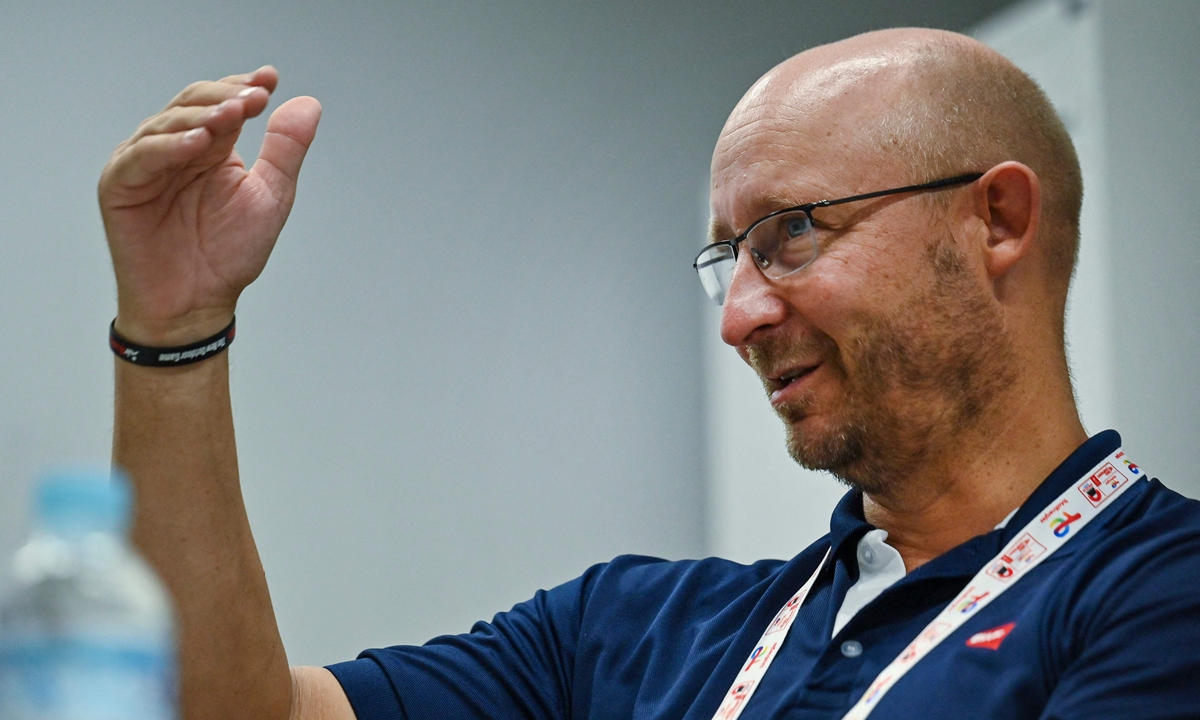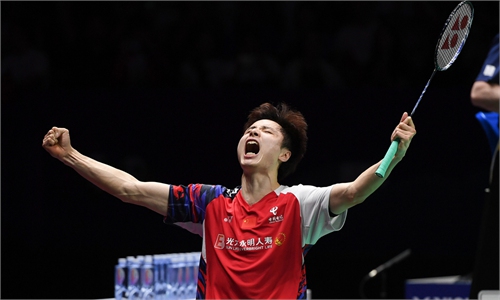
BWF Secretary-General Thomas Lund Photo: VCG
The Badminton World Federation (BWF) has encountered issues this year over how to best maintain players' health and well-being on the court. Thomas Lund, BWF secretary-general, exhibited a proactive attitude toward solving this issue during an exclusive interview with the Global Times.
In early December, two-time Olympic men's singles champion Viktor Axelsen took swipes at the BWF for not showing enough support to athletes' health.
Axelsen was forced to withdraw from the World Tour Finals due to injury but he faced a fine from the BWF.
The BWF required his "medical documents, if any, or any other supporting documents to seek a waiver of the penalty for not playing in the World Tour Finals," according to an email which Axelsen shared on social media.
"As a top committed player, it's mandatory to play in the World Tour Finals should a player qualify for the World Tour Finals," the BWF said in the email.
In response to the issue, Lund told the Global Times that athletes' health and well-being are the priorities.
"If a player is physically not able to travel, for example in cases of very serious injury, the BWF will issue an exemption from not participating, and no further consequences apply," Lund told the Global Times in an exclusive interview.
"Only in cases where a player is medically capable of traveling but decides not to appear and participate in the minimum media/commercial activities to support the tournament, will the player be charged $5,000 for non-participation," he said.
Axelsen ultimately showed up in Hangzhou in a promotional event for the World Tour Finals held at the iconic West Lake, a UNESCO World Heritage Site, on Saturday.
"To safeguard the players, the BWF leaves it entirely up to each player to decide if they can play or not, and, therefore, there are no obligations to force them to play. The BWF recognizes that players should not in any way be forced to play with an injury," Lund said.
First aid
The tragic passing of Chinese junior player Zhang during competition in Indonesia in June prompted a critical evaluation of the BWF's emergency protocols.
Speaking on this matter, Lund said the BWF initiated an urgent review of its Medical Emergency Intervention Protocols that led to the empowerment of medical staff to immediately enter the court and provide first aid in cases of suspected cardiac arrest or concussion with blackout, without requiring direction from the referee.
The updates were approved by the BWF Council on November 9 and took effect immediately, Lund said, before adding that the BWF has begun exploring further measures, including potential new first aid protocols and guidelines for the education of tournament personnel.
At the World Tour Finals in Hangzhou, medical equipment such as AED has been put in place on the sidelines of the court, the Global Times has found.
"We have also encouraged member associations to conduct regular health monitoring of athletes within high-performance structures as a proactive step in safeguarding player health," Lund said.
"We again express our deepest condolences to Zhang Zhijie's family, as well as to his teammates, the Chinese Badminton Association, and the entire Chinese badminton community," he added.
Great cooperation
Hangzhou will continue to host the World Tour Finals in 2025 and 2026, while Xiamen in East China's Fujian Province will host the mixed team competition Sudirman Cup in 2025.
China's status as a badminton powerhouse is well-documented, as the national team has won 22 Olympic gold medals since badminton made its debut as an Olympic medal event in 1992.
Generations of legendary badminton players such as Lin Dan, Chen Long, Zhang Ning, and Li Xuerui have been household names.
Along with the fervent fan support in badminton competitions and a culture that embraces the sport from the grassroot to elite level, it has made China an indispensable partner for the BWF, Lund said.
"We are always very happy to bring our BWF major championships to China and we have great cooperation with the Chinese Badminton Association and the various local governments to deliver successful badminton tournaments," Lund told the Global Times.
"It's essential we maintain badminton's relevance and popularity in China for years to come," Lund noted.
Innovating for future
As the BWF seeks to expand its global reach through badminton, it is also exploring ways to modernize the sport and engage younger audiences.
Innovations include the development of automated service fault detection and time clock functionality to streamline gameplay, with plans to roll out the former by 2025.
The BWF is also leveraging social media to captivate the attention of younger generations. Lund elaborated on the strategy.
"We're currently partnering with other influential publishers and talent to help drive this new traction for us. Our point of engagement with the younger fans is more authentic and caters to their consumption habits and preferences."
Efforts like AirBadminton and collaborations with content creators aim to make badminton more accessible and appealing worldwide, Lund said.
"We know that we can't do all promotional and engagement initiatives ourselves, and we can't expect to have a strong footprint everywhere in the world immediately," Lund said.
"Our core mission is to get as many people to play badminton for life ... But we are confident our development systems and grassroot programs are robust enough to attract new players."



